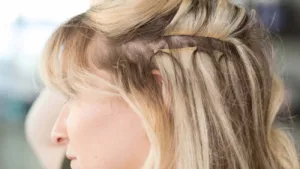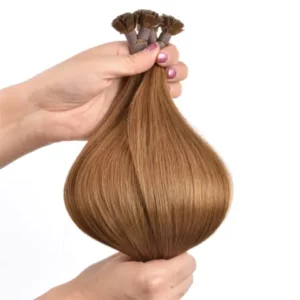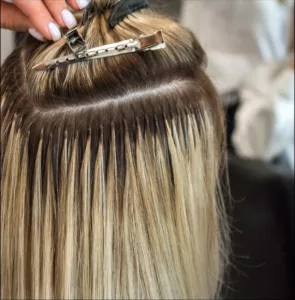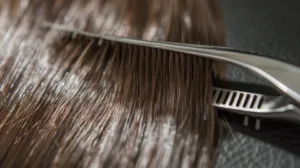Thin hair can be frustrating when extensions show through or feel bulky. Many people worry that the wrong method will look unnatural. The solution lies in invisible systems designed to blend seamlessly.
The most invisible hair extensions for thin hair are genius wefts, hand-tied wefts, invisible tape-ins, and V-light extensions. These methods are ultra-flat, lightweight, and designed to blend naturally without adding visible bulk at the scalp.

This article explores why invisibility matters, compares the best systems, and gives care tips for thin hair wearers. It also includes answers to common questions professionals and clients often ask.
Why thin hair needs invisible hair extensions?
Thin hair struggles more than dense hair to hide extension tracks. Visible seams, bumps, or bulk can make results look fake and uncomfortable.
Invisible hair extensions give a smooth finish, reduce scalp strain, and allow thin hair to move naturally. They protect fragile strands while delivering length and volume without obvious signs of wear.
Dive deeper
People with fine or thin hair face three main problems when choosing extensions:
1) Concealment and coverage
Fine hair offers less natural coverage. Traditional bulky wefts create ridges or shadows that are easy to spot, especially near the parting or hairline. Invisible bases reduce thickness so the extensions disappear under fewer natural layers.
2) Comfort and scalp safety
Thin hair follicles are weaker and can’t tolerate as much weight. Heavy extensions may strain follicles and increase the risk of breakage. Invisible methods are flat and lightweight, making them more comfortable for fragile scalps.

3) Styling flexibility
Thin hair wearers often want to tie ponytails, braids, or updos. Visible tracks ruin the look. Invisible extensions allow free styling because they stay hidden even in high ponytails.
| Concern | Problem with bulky methods | Solution with invisible methods |
|---|---|---|
| Concealment | Tracks show easily | Ultra-flat, low-profile bases |
| Comfort | Extra weight causes strain | Lightweight systems reduce pull |
| Styling | Limited to down styles | Ponytails and updos possible |
What are the most invisible hair extensions for thin hair?
Several systems meet the needs of thin hair. Each has unique benefits depending on the client’s density, styling habits, and lifestyle.
The most invisible hair extensions for thin hair include genius wefts, hand-tied wefts, invisible tape-ins, and V-light extensions. These combine thin, flat bases with natural blending for minimal visibility.
Dive deeper
Genius weft / hand-tied weft
What they are:
Genius wefts are machine-made but ultra-thin, with no return hair. Hand-tied wefts are stitched manually, creating very flat seams.
Installation:
Attached with beads or sewn into anchor rows. Multiple rows can be stacked without adding bulk.

Why they suit thin hair:
The base lies close to the scalp, creating a smooth transition. They hide well under fine layers and are reusable, offering longevity.

Invisible tape-in extensions
What they are:
Tape extensions with hair injected into a transparent polyurethane (PU) strip. The tape mimics natural hair growth.
Installation:
Natural hair is sandwiched between two tapes or paired with single-sided tape. Placement is quick and low-tension.
Why they suit thin hair:
Clear tapes and injected hair make bonds disappear even in exposed areas. They are very flat and ideal for fine coverage.

V-light hair extensions
What they are:
A new UV-bonded method using tiny transparent adhesive points. Bonds are smaller than grains of rice.
Installation:
Individual strands are fixed with a UV light tool. Bonds cure instantly and remain invisible.
Why they suit thin hair:
Because the bonds are tiny and transparent, they blend seamlessly with very fine or sparse hair. Even close inspection makes them hard to detect.
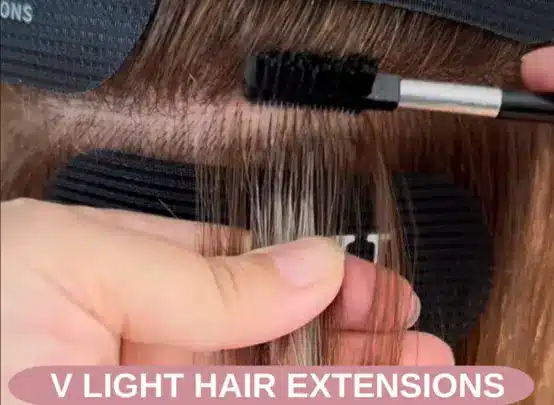
| Extension type | Installation | Invisibility | Best for |
|---|---|---|---|
| Genius / Hand-tied weft | Sewn/beaded rows | Very flat, stackable | Medium to fine density |
| Invisible tape-in | PU sandwich | Disappears in partings | Fine, fragile hair |
| V-light | UV micro-bonds | Smallest, clearest | Very thin or sparse hair |
How should thin hair clients care for extensions?
Even the most invisible extensions need proper care. Thin hair is fragile, so gentle maintenance keeps both natural hair and extensions healthy.
Thin hair with extensions needs daily gentle brushing, careful washing, heat protection, and night care. Avoid heavy oils on the scalp, sleep with braids or silk pillowcases, and keep move-ups on schedule.
Dive deeper
Brushing
- Use a loop brush or soft bristle brush.
- Support the base with one hand while brushing ends to roots.
- Brush twice daily to prevent tangles without stressing follicles.
Washing
- Use sulfate-free shampoo and lightweight conditioner.
- Apply conditioner only on lengths, never at anchors.
- Wash 2–3 times weekly and always dry the base fully.
Heat styling
- Apply heat protectant before curling or straightening.
- Keep irons and blow dryers away from anchor points.
- Choose moderate heat (below 180°C/355°F).
Sleeping
- Tie hair in a loose braid or low ponytail.
- Use silk or satin pillowcases to reduce friction.
- Never sleep with wet hair or damp bases.
Move-ups and check-ins
- Book maintenance every 6–8 weeks.
- Do not let rows grow down too far.
- Thin hair benefits from lighter weight and timely adjustments.
| Care area | Key action | Why it matters |
|---|---|---|
| Brushing | Ends-to-roots, support base | Prevents tension |
| Washing | Light products, dry base | Stops slippage |
| Heat | Protectant + moderate heat | Preserves fibers |
| Sleeping | Braid + silk pillow | Stops tangling |
| Maintenance | 6–8 weeks | Reduces traction |

My opinion
For thin hair, invisibility is essential—not a luxury. Genius and hand-tied wefts offer long wear, invisible tape-ins give simplicity, and V-light works for the most fragile cases. No matter the method, gentle care and timely maintenance protect results.
FAQ
Which extensions are most invisible for very thin hair?
V-light extensions are the most discreet for sparse density.
Are tape-ins too heavy for thin hair?
Invisible tape-ins are lightweight when applied in small amounts. Correct mapping makes them safe.
Do hand-tied wefts damage thin hair?
Not if grams per row are matched to density and rows are maintained on time.
How often should thin hair move-ups be done?
Every 6–8 weeks. Waiting longer increases traction and visibility.
Can thin hair handle multiple rows?
Yes, if each row is light. Avoid stacking heavy wefts in one area.
Do invisible extensions feel more comfortable?
Yes, flat bases reduce pressure and feel lighter against the scalp.
Are invisible extensions reusable?
Genius wefts and invisible tape-ins can be reused. V-light needs reapplication each cycle.
Can I style invisible extensions in a ponytail?
Yes, their flat design allows ponytails, braids, and even slick updos without showing.
Do thin hair clients need special products?
Yes, sulfate-free shampoos, lightweight conditioners, and alcohol-free styling products are recommended.
Can invisible extensions last a full year?
The hair itself can last up to a year with full cuticle quality, but bonds need move-ups every 6–8 weeks.
Conclusion
Invisible extensions give thin hair natural fullness without exposure. Genius wefts, invisible tape-ins, and V-light bonds deliver seamless results when combined with gentle care and consistent maintenance.
Hibiscus Hair Manufacturer has been dedicated to producing high-quality hair extensions for 25 years and is a recognized leader in the industry. If you are interested in finding a reliable hair extensions supplier and wholesale for your brand, please visit our website for more information:
HOME

